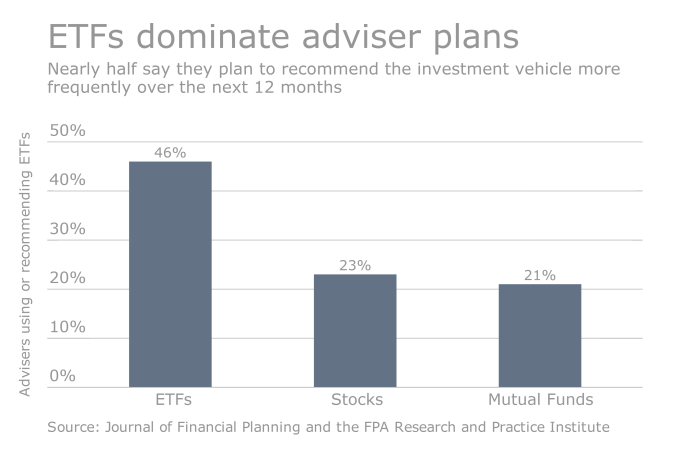
Starting with Investment Advisors Specializing in ETFs, this introduction aims to provide a compelling overview of the topic, offering valuable insights and information for readers interested in ETF investments.
The subsequent paragraph will delve deeper into the specifics of investment advisors specializing in ETFs and the benefits they offer to investors.
Investment Advisors Specializing in ETFs

Investment advisors specializing in ETFs play a crucial role in guiding investors on how to strategically allocate their funds in Exchange-Traded Funds (ETFs). They offer expertise in selecting the right ETFs based on individual risk tolerance, investment goals, and market conditions.
Popular ETFs Recommended by Investment Advisors
- SPDR S&P 500 ETF Trust (SPY)
- Invesco QQQ Trust (QQQ)
- iShares Core S&P 500 ETF (IVV)
- Vanguard Total Stock Market ETF (VTI)
Benefits of Investing in ETFs
- Low expense ratios compared to mutual funds
- Instant diversification across various asset classes
- High liquidity and ease of trading on the stock exchange
- Transparency of holdings and performance tracking
Tailoring Strategies for ETF Investments
Investment advisors customize ETF investment strategies based on the client’s risk profile, time horizon, and financial objectives. They may recommend a mix of equity, bond, and commodity ETFs to achieve a diversified portfolio that aligns with the investor’s goals.
Importance of Diversification in ETF Portfolios
Diversification is key in ETF portfolios advised by professionals as it helps mitigate risk by spreading investments across different sectors, regions, and asset classes. By diversifying holdings, investors can reduce the impact of volatility in any single investment, enhancing the overall stability of the portfolio.
Investment Advice
Investment advisors specializing in ETFs offer a range of advice to help clients achieve their financial goals through strategic investment in Exchange-Traded Funds (ETFs).
Types of Investment Advice
Advisors specializing in ETFs typically offer advice on asset allocation, portfolio diversification, risk management, and investment selection. They may also provide guidance on tax-efficient investing and rebalancing strategies.
Comparison with Traditional Stock Investments
- ETFs offer diversification benefits by investing in a basket of securities, reducing the risk associated with individual stock holdings.
- ETFs are passively managed, tracking a specific index, which can lead to lower fees compared to actively managed mutual funds or individual stock investments.
- Investment advisors may recommend ETFs for investors seeking broad market exposure or specific sector allocations.
Common Strategies for Maximizing Returns
- Utilizing dollar-cost averaging to invest a fixed amount regularly in ETFs, regardless of market fluctuations.
- Implementing a buy-and-hold strategy to capitalize on long-term market growth and avoid frequent trading.
- Considering sector rotation or thematic ETFs to capitalize on market trends or emerging industries.
Significance of Risk Management
Risk management is crucial in ETF investing, as advisors aim to balance risk and return based on each client’s financial objectives and risk tolerance. Strategies may include setting stop-loss orders, using ETFs with low volatility, or diversifying across asset classes to mitigate risk.
Investment Advisor
Investment advisors specializing in ETFs are financial professionals who provide guidance and advice to clients on investing in Exchange-Traded Funds. They play a crucial role in helping individuals and institutions make informed decisions to achieve their financial goals.
Qualifications and Expertise
To become an investment advisor specializing in ETFs, individuals typically need to have a strong educational background in finance, economics, or a related field. Most advisors hold relevant certifications such as Chartered Financial Analyst (CFA) or Certified Financial Planner (CFP). Additionally, gaining experience in the financial industry and staying updated with the latest trends in ETFs is essential to excel in this role.
Responsibilities
- Educating clients about the benefits and risks of ETF investments
- Analyzing market trends and performance of various ETFs
- Creating customized investment strategies based on client goals
- Monitoring and rebalancing client portfolios regularly
- Providing ongoing support and guidance to clients
Staying Updated with Market Trends
Investment advisors specializing in ETFs need to continuously educate themselves on market trends, new ETF products, and changes in regulations. They often attend conferences, seminars, and workshops to stay informed. Additionally, leveraging financial news sources, research reports, and data analytics tools is crucial for staying ahead in the ever-evolving financial landscape.
Ethical Considerations
- Acting in the best interest of clients (fiduciary duty)
- Disclosing any conflicts of interest
- Maintaining confidentiality of client information
- Avoiding fraudulent or misleading practices
- Complying with industry regulations and standards
Investment Banking

Investment banking plays a crucial role in the financial ecosystem, especially when it comes to ETF investments. Investment advisors specializing in ETFs often collaborate with investment banks to provide clients with comprehensive financial services tailored to their needs.
Collaboration with Investment Banks
Investment advisors work closely with investment banks to access a wide range of services that enhance the overall investment experience. These services may include underwriting new ETF products, providing market research and analysis, and offering strategic advice on portfolio management.
Relevant Investment Banking Services
- Underwriting: Investment banks help ETF issuers bring new products to market by underwriting the issuance of ETF shares.
- Market Research: Investment banks provide valuable insights and analysis on market trends, helping advisors make informed investment decisions.
- Mergers & Acquisitions: Investment banks assist in M&A activities related to ETF providers, influencing the landscape of available products.
Role in Creating and Managing ETF Products
Investment banks play a crucial role in creating and managing ETF products by structuring the funds, determining the optimal pricing strategy, and ensuring compliance with regulatory requirements. They also help market and distribute ETFs to investors, contributing to the overall success of these investment vehicles.
Investment Horizon
Investment horizon refers to the length of time an investor expects to hold an investment before selling it. It is a crucial factor in determining the appropriate ETF investment strategy based on the investor’s goals, risk tolerance, and time horizon.
Short-Term Investment Horizon
Short-term investment horizons typically range from a few months to one year. Investors with short-term horizons may focus on ETFs with high liquidity and low volatility, as they aim to capitalize on short-term market movements or specific events.
Medium-Term Investment Horizon
Medium-term investment horizons typically range from one to five years. Investors with medium-term horizons may seek a balance between growth and stability by investing in a mix of equity and fixed-income ETFs. They are more tolerant of market fluctuations compared to short-term investors.
Long-Term Investment Horizon
Long-term investment horizons typically extend beyond five years. Investors with long-term horizons may focus on ETFs with strong growth potential and higher risk, as they have a longer time frame to ride out market fluctuations. They may also consider diversification across various asset classes to mitigate risk.Investment horizons play a significant role in determining the choice of ETFs and overall portfolio allocation.
Short-term investors may prioritize short-term gains and liquidity, while long-term investors may focus on growth potential and diversification. Understanding the impact of investment horizons on risk tolerance and return expectations is crucial for investment advisors specializing in ETFs to tailor their recommendations to clients’ individual needs.
Investment Opportunities
When it comes to investment opportunities in the ETF market, advisors specializing in ETFs play a crucial role in identifying and selecting promising prospects for their clients. These experts carefully evaluate various factors to ensure that their clients can benefit from lucrative opportunities while managing risks effectively.
Identifying Promising Opportunities
Investment advisors specializing in ETFs utilize a combination of quantitative analysis, market research, and industry expertise to identify promising investment opportunities. They assess factors such as market trends, economic indicators, and company performance to pinpoint ETFs that have the potential for strong growth.
- Utilizing advanced analytical tools to evaluate historical performance and volatility of ETFs.
- Conducting thorough research on underlying assets and market conditions to gauge future potential.
- Assessing macroeconomic trends and geopolitical factors that could impact the performance of specific ETFs.
Emerging Sectors and Trends
Investment advisors specializing in ETFs keep a close eye on emerging sectors and trends that present lucrative investment opportunities for their clients. By identifying sectors with high growth potential or disruptive technologies, these advisors can help clients capitalize on new market developments through strategic ETF investments.
- Exploring opportunities in sectors such as renewable energy, artificial intelligence, and e-commerce.
- Monitoring trends like ESG (Environmental, Social, and Governance) investing and thematic ETFs.
- Identifying niche markets or innovative industries that offer unique investment prospects through ETFs.
Importance of Research and Due Diligence
Thorough research and due diligence are essential components of identifying profitable investment opportunities in the ETF market. Investment advisors specializing in ETFs conduct in-depth analysis to ensure that their clients’ portfolios are well-positioned to benefit from market movements and capitalize on growth opportunities.
- Performing fundamental analysis on ETF holdings and performance metrics.
- Evaluating risk factors and diversification strategies to optimize portfolio returns.
- Regularly monitoring market dynamics and adjusting investment strategies based on changing conditions.
Investment Strategy
Investment advisors specializing in ETFs employ various strategies to help clients achieve their financial goals while managing risk effectively. These strategies are tailored to individual client needs and market conditions.
Common Investment Strategies
- Passive Investing: This strategy involves tracking a specific index by investing in a diversified portfolio of ETFs that mirror the index, aiming to match its performance.
- Active Investing: Advisors actively manage ETF portfolios by selecting and adjusting investments based on market trends and opportunities to outperform the market.
- Sector Rotation: This strategy involves shifting investments between different sectors based on economic cycles and sector performance to capitalize on growth opportunities.
Strategic Asset Allocation Models
- 60/40 Portfolio: A traditional model that allocates 60% of the portfolio to equities (through ETFs) and 40% to fixed income securities to balance risk and return.
- All-Weather Portfolio: This model aims to perform well in various market conditions by diversifying assets across equities, bonds, gold, and other assets using ETFs.
Role of Market Analysis
Market analysis plays a crucial role in shaping investment strategies recommended by advisors. By analyzing market trends, economic indicators, and geopolitical events, advisors can make informed decisions on asset allocation and investment selection to optimize returns.
Customized Strategies for Clients
Advisors customize investment strategies based on clients’ financial goals, risk tolerance, investment horizon, and other personal factors. By understanding each client’s unique circumstances, advisors can tailor ETF portfolios to meet specific objectives and preferences.
Concluding our discussion on Investment Advisors Specializing in ETFs, we have explored the crucial role of these advisors in guiding investors towards successful ETF investments, emphasizing the importance of tailored strategies and expert advice for optimal portfolio growth.
Key Questions Answered
What are some popular ETFs recommended by investment advisors?
Examples of popular ETFs often recommended by investment advisors include SPDR S&P 500 ETF, iShares Core S&P 500 ETF, and Vanguard Total Stock Market ETF.
How do investment advisors tailor strategies for ETF investments?
Investment advisors tailor strategies for ETF investments by considering factors such as risk tolerance, investment goals, and market trends to create diversified portfolios that align with clients’ financial objectives.
What qualifications are required to become an investment advisor specializing in ETFs?
Becoming an investment advisor specializing in ETFs typically requires relevant certifications such as CFA (Chartered Financial Analyst) or CFP (Certified Financial Planner) and a deep understanding of ETF products and market dynamics.
How do investment horizons impact ETF investment strategies?
Investment horizons play a crucial role in determining the choice of ETFs, portfolio allocation, and risk management strategies, influencing overall investment decisions based on clients’ timeframes and objectives.





